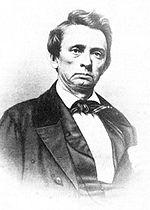 |
| Parson Brownlow |
DECEMBER 6, 1861.
CONFEDERATE STATES OF AMERICA, District of Tennessee.
TO THE MARSHAL OF SAID DISTRICT:
J. C. Ramsey, C. S. District attorney for said district, having made oath before me that he is informed and believes that William G. Brownlow, a citizen of said district and owing allegiance and fidelity to the Confederate States but being moved and seduced by the instigation of the devil and not having the fear of God before his eyes, did wilfully, knowingly and with malice aforethought and feloniously commit the crime of treason against the Confederate States by then and there within said district and since the 8th day of June last publishing a weekly and tri-weekly paper know as Brownlow's Koxville Whig; said paper had a large circulation in said district and also circulated in the United States and contained weekly divers of editorials written by the said Brownlow which said editorials were treasonable against the Confederate States of America, and did then and there commit treason and prompt others to commit treason; by speech as well as publication did as aforesaid commit treason and did give aid and comfort to the United States, both of said Governments being in a state of war with each other. You are therefore commanded to arrest the said Brownlow and bring him before me to be dealt with as the laws directs.
R. B. REYNOLDS,
Commissioner, &c.
KNOXVILLE, December 6, 1861.
Major-General CRITTENDEN: I am now under an arrest upon a warrant signed by Messers. Reynolds and Ramsey upon a charge of treason founded upon sundry articles published in the Knoxville Whig since June last. I am here upon your invitation and promise of passports; and claiming your protection as I do I shall await your early response.
Very respectfully,
W. G. BROWNLOW.
Official Records, Series II., Vol. 1, Part 1, Page 922
Brownlow was a Unionist newspaper publisher out of Knoxville, known as Parson Brownlow for his previous occupation as a Methodist circuit-rider. In that occupation, and as a newspaperman, Browlow became famous for the vitrolic rhetoric he employed against those who opposed his views. But it can be said he and his paper represented the views of most eastern Tennessee residents. Crittenden promised a pass through the lines to Tennessee to rid himself of Brownlow, but the warrant described above placed him in the hands of his enemies and in prison. Confederate authorities became aware of the unusually harsh conditions Brownlow was held under and ordered his release in March. After the war he became Governor of Tennessee.
No comments:
Post a Comment